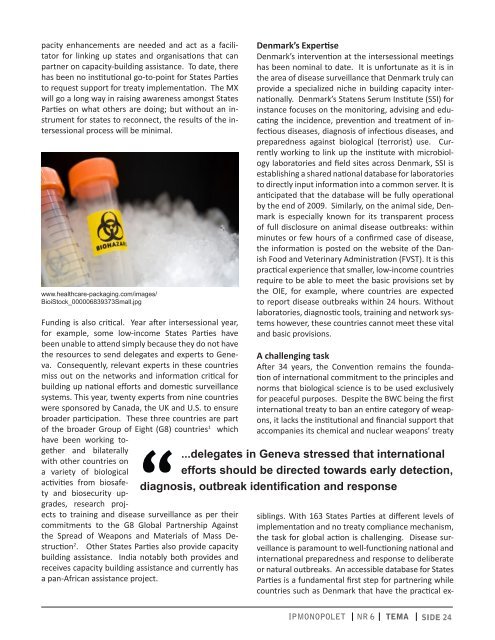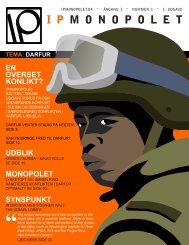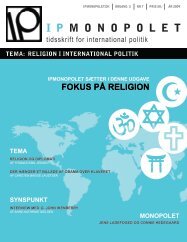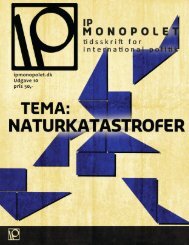fokus på krigens folkeret - IPmonopolet
fokus på krigens folkeret - IPmonopolet
fokus på krigens folkeret - IPmonopolet
Create successful ePaper yourself
Turn your PDF publications into a flip-book with our unique Google optimized e-Paper software.
pacity enhancements are needed and act as a facilitator<br />
for linking up states and organisations that can<br />
partner on capacity-building assistance. To date, there<br />
has been no institutional go-to-point for States Parties<br />
to request support for treaty implementation. The MX<br />
will go a long way in raising awareness amongst States<br />
Parties on what others are doing; but without an instrument<br />
for states to reconnect, the results of the intersessional<br />
process will be minimal.<br />
www.healthcare-packaging.com/images/<br />
BioiStock_000006839373Small.jpg<br />
Funding is also critical. Year after intersessional year,<br />
for example, some low-income States Parties have<br />
been unable to attend simply because they do not have<br />
the resources to send delegates and experts to Geneva.<br />
Consequently, relevant experts in these countries<br />
miss out on the networks and information critical for<br />
building up national efforts and domestic surveillance<br />
systems. This year, twenty experts from nine countries<br />
were sponsored by Canada, the UK and U.S. to ensure<br />
broader participation. These three countries are part<br />
of the broader Group of Eight (G8) countries 1 which<br />
have been working to-<br />
gether and bilaterally<br />
with other countries on<br />
a variety of biological<br />
activities from biosafety<br />
and biosecurity upgrades,<br />
research projects<br />
to training and disease surveillance as per their<br />
commitments to the G8 Global Partnership Against<br />
the Spread of Weapons and Materials of Mass Destruction<br />
2 . Other States Parties also provide capacity<br />
building assistance. India notably both provides and<br />
receives capacity building assistance and currently has<br />
a pan-African assistance project.<br />
Denmark’s Expertise<br />
Denmark’s intervention at the intersessional meetings<br />
has been nominal to date. It is unfortunate as it is in<br />
the area of disease surveillance that Denmark truly can<br />
provide a specialized niche in building capacity internationally.<br />
Denmark’s Statens Serum Institute (SSI) for<br />
instance focuses on the monitoring, advising and educating<br />
the incidence, prevention and treatment of infectious<br />
diseases, diagnosis of infectious diseases, and<br />
preparedness against biological (terrorist) use. Currently<br />
working to link up the institute with microbiology<br />
laboratories and field sites across Denmark, SSI is<br />
establishing a shared national database for laboratories<br />
to directly input information into a common server. It is<br />
anticipated that the database will be fully operational<br />
by the end of 2009. Similarly, on the animal side, Denmark<br />
is especially known for its transparent process<br />
of full disclosure on animal disease outbreaks: within<br />
minutes or few hours of a confirmed case of disease,<br />
the information is posted on the website of the Danish<br />
Food and Veterinary Administration (FVST). It is this<br />
practical experience that smaller, low-income countries<br />
require to be able to meet the basic provisions set by<br />
the OIE, for example, where countries are expected<br />
to report disease outbreaks within 24 hours. Without<br />
laboratories, diagnostic tools, training and network systems<br />
however, these countries cannot meet these vital<br />
and basic provisions.<br />
A challenging task<br />
After 34 years, the Convention remains the foundation<br />
of international commitment to the principles and<br />
norms that biological science is to be used exclusively<br />
for peaceful purposes. Despite the BWC being the first<br />
international treaty to ban an entire category of weapons,<br />
it lacks the institutional and financial support that<br />
accompanies its chemical and nuclear weapons’ treaty<br />
...delegates in Geneva stressed that international<br />
efforts should be directed towards early detection,<br />
diagnosis, outbreak identification and response<br />
siblings. With 163 States Parties at different levels of<br />
implementation and no treaty compliance mechanism,<br />
the task for global action is challenging. Disease surveillance<br />
is paramount to well-functioning national and<br />
international preparedness and response to deliberate<br />
or natural outbreaks. An accessible database for States<br />
Parties is a fundamental first step for partnering while<br />
countries such as Denmark that have the practical ex-<br />
IPMONOPOLET NR 6 TEMA<br />
SIDE 24





